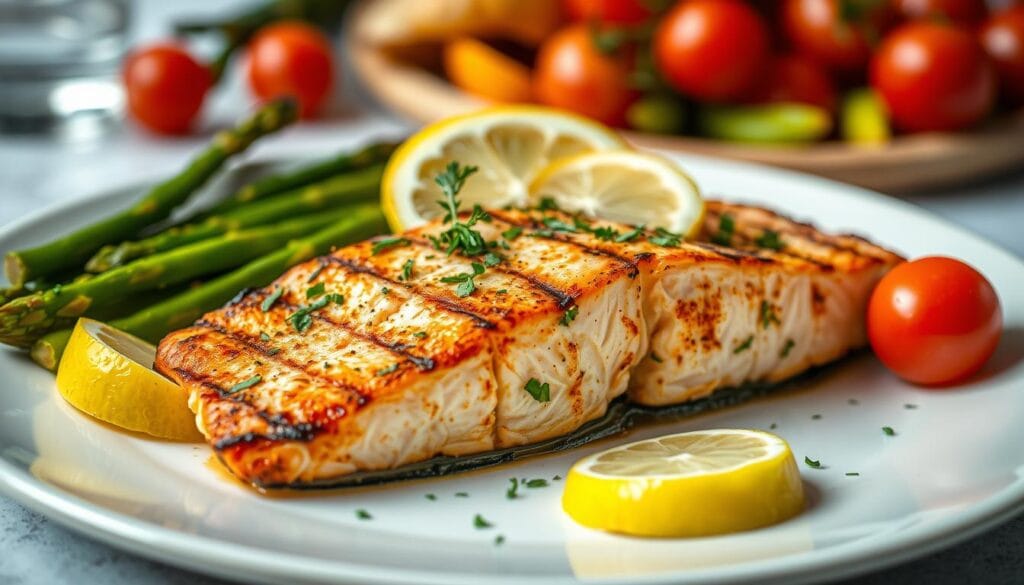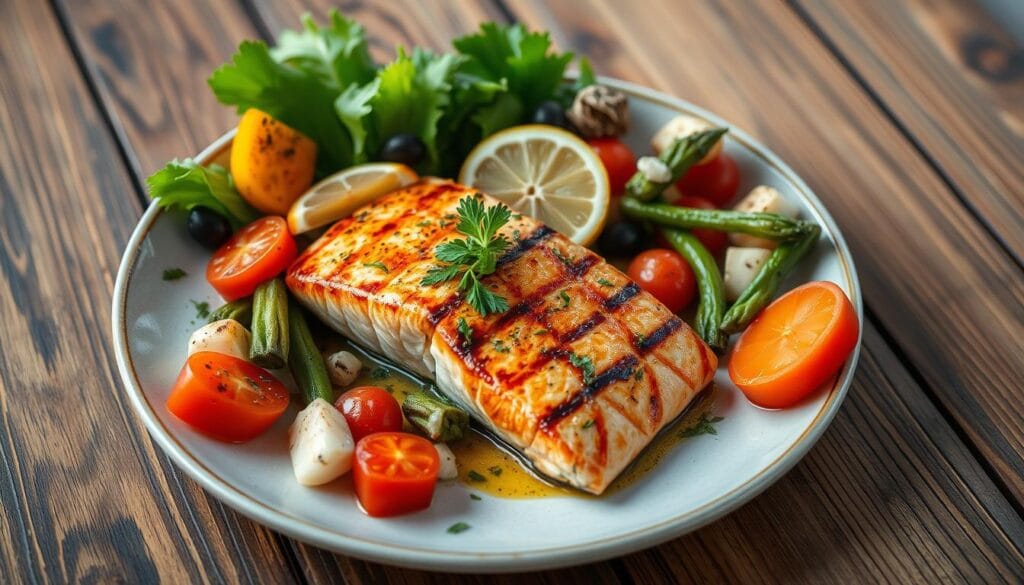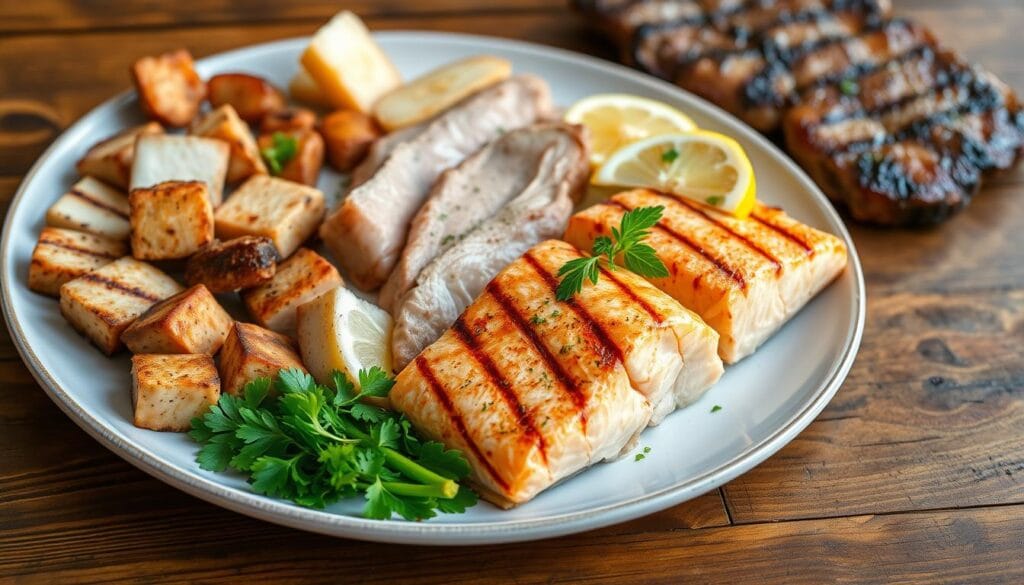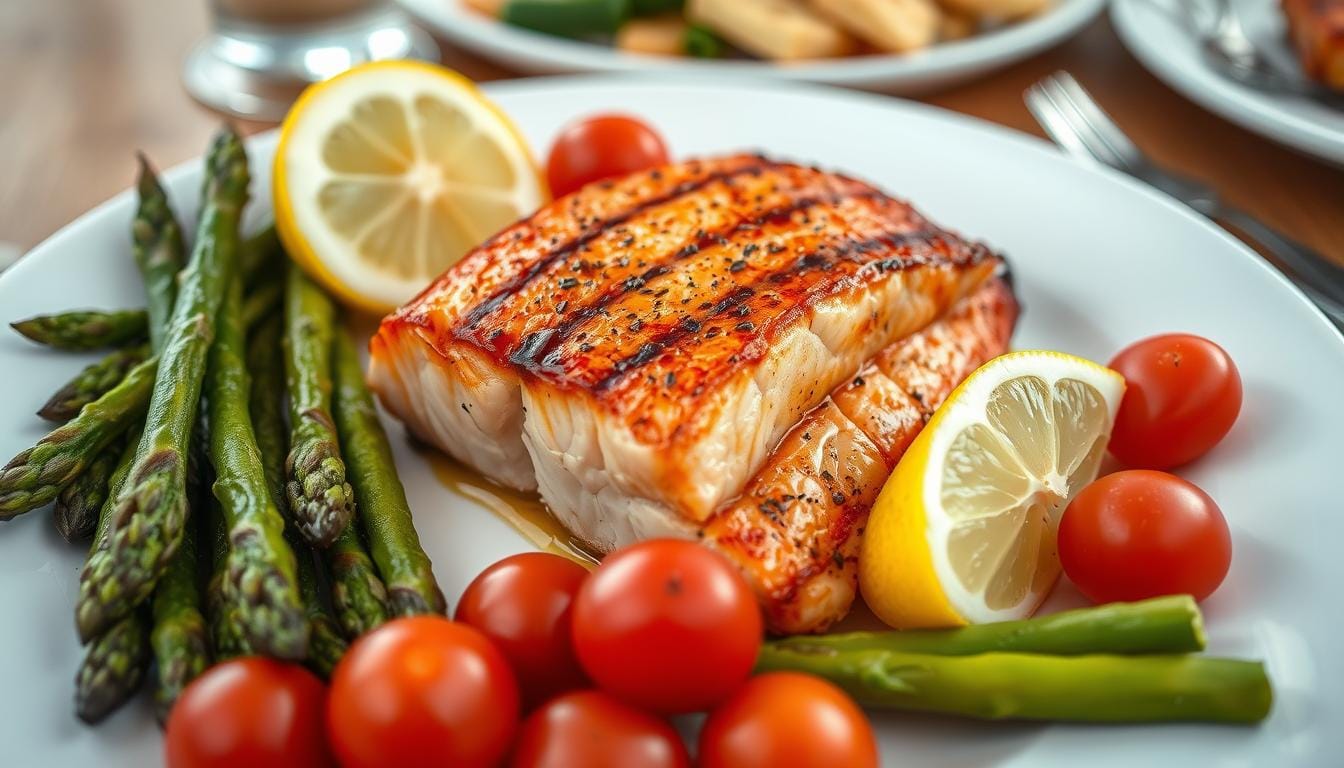Ever stared at a grilled salmon fillet, wondering about its health benefits? You’re not alone. Knowing the calories in grilled salmon can change how you eat. A 6-ounce fillet has about 256 calories, making it great for those watching their diet.
Grilled salmon is more than just calories. It’s full of nutrients like omega-3 fatty acids and proteins. These nutrients are key for a healthy body.
If you’re into fitness, health, or just want to eat better, knowing salmon’s calories is important. Let’s explore why salmon is a great choice for your meals.
Table of Contents
Understanding Grilled Salmon Nutrition
Exploring salmon nutrition shows it’s a health powerhouse. Grilled salmon is not just tasty; it’s full of nutrients that boost your health. Knowing about salmon calories and nutrients helps you choose better food.

Choosing grilled salmon means picking a meal rich in health benefits. Let’s look at what makes salmon a superfood:
Key Nutritional Components
- High-quality protein for muscle growth
- Rich omega-3 fatty acids for heart and brain health
- Essential vitamins and minerals
A 4-ounce grilled salmon serving is packed with nutrients:
| Nutrient | Amount |
|---|---|
| Calories | 248 calories |
| Protein | 31 grams |
| Total Fat | 13.1 grams |
| Vitamin B12 | 2.6 micrograms |
Health Benefits of Grilled Salmon
The calories in salmon offer big health benefits. Eating it regularly can:
- Help your heart with omega-3 fatty acids
- Boost brain function and thinking
- Support thyroid health and metabolism
- Help keep muscles strong and growing
“Salmon is nature’s multivitamin, delivering nutrients in a delicious package.” – Nutrition Expert
Adding grilled salmon to your diet is a smart choice for health. It’s lean protein, good fats, and vitamins make it great for staying healthy.
Caloric Content of Grilled Salmon
Knowing the calories in grilled salmon helps you choose better. It’s a protein-rich food that’s good for many diets. It also gives you important nutrients.

The size of your grilled salmon matters for calories. A 6-ounce piece has about 256 calories. This makes it a good, not too high, protein choice.
Calories per Serving Size
The size of your grilled salmon affects how many calories you eat. Here’s how calories change with different weights:
- 3-ounce serving: 121 calories
- 6-ounce serving: 256 calories
- 100 grams of wild salmon: 136 calories
Factors Affecting Caloric Content
Several things can change how many calories are in your grilled salmon:
- Cooking method: Grilling can change some nutrients
- Marinades or oils you add
- Whether it’s wild or farmed salmon
| Salmon Type | Calories | Protein | Fat |
|---|---|---|---|
| Wild Salmon | 136 per 100g | 122.3g | 4.94g |
| Farmed Salmon | Slightly higher | Varies | Higher fat content |
Pro tip: Choose wild salmon for a leaner protein option with consistent nutritional benefits.
Keeping track of your grilled salmon size helps you eat well. It lets you enjoy a tasty, healthy meal.
Comparing Grilled Salmon to Other Proteins
Grilled salmon is a nutritional powerhouse among protein sources. Knowing how salmon calories compare to other proteins helps in making better dietary choices.

Choosing the right protein is key to a balanced diet. Grilled salmon has unique nutritional benefits that outshine traditional proteins like chicken and beef.
Salmon vs. Chicken Breast
Let’s look at the nutritional differences between salmon and chicken breast:
| Nutrient | Grilled Salmon (100g) | Chicken Breast (100g) |
|---|---|---|
| Calories | 206 | 165 |
| Protein | 22g | 31g |
| Omega-3 Fatty Acids | High | Low |
Chicken breast has fewer calories, but salmon calories are rich in essential omega-3 fatty acids. These are not found in chicken.
Salmon vs. Beef
Salmon and beef have different nutritional profiles:
- Salmon has more heart-healthy omega-3s
- Beef has more saturated fat
- Salmon calories offer better nutrient diversity
“Wild-caught salmon is one of the most nutrient-dense foods globally” – Nutrition Experts
Grilled salmon offers better nutrition than traditional proteins. Its unique taste and nutritional value make it a great dietary choice.
Cooking Methods and Their Impact on Calories
How you cook salmon can change its calorie count and nutrients. It’s important to know how different cooking methods affect your meal. This helps keep the fish’s nutritional value at its best.
Grilling is a favorite way to cook salmon because it keeps calories low. The high heat of grilling melts fat and adds flavor without extra calories.
Exploring Grilling’s Nutritional Impact
Grilling salmon leads to some interesting changes:
- Fat reduction through natural dripping
- Preservation of protein content
- Minimal addition of extra cooking oils
- Enhanced flavor without significant calorie increase
Alternative Cooking Techniques for Salmon
Other cooking methods can also keep salmon’s nutrients intact:
- Baking: Minimal added fats, controlled temperature
- Poaching: Low-calorie method preserving moisture
- Broiling: Quick cooking with possible fat reduction
“The key is selecting a cooking method that preserves nutrients while managing calorie intake.” – Nutrition Expert
A 4-6 oz grilled salmon filet has about 346 calories. Your cooking method might change this a bit. But the nutritional benefits stay high.
Portion Sizes and Serving Suggestions
Knowing the right grilled salmon serving size can change how you plan meals and what you eat. A standard serving is 4-6 ounces. It gives you the right amount of protein and important nutrients.
- Calories: 208 kcal
- Protein: 23 grams
- Fat: 12 grams
- Carbohydrates: 2 grams
Recommended Serving Sizes
Your salmon portion should match your diet needs. Nutritionists suggest:
- Athletes: 6-8 ounces per serving
- Weight management: 4-5 ounces per serving
- General health: 4 ounces per serving
Tasty Accompaniments for Salmon
Pair your grilled salmon with healthy side dishes for a balanced meal. Roasted vegetables, quinoa, or a light salad go great with it. They also help keep calories low.
“A well-portioned salmon meal can be both delicious and nutritionally complete.” – Nutrition Expert
Remember, the right portion size is key to getting the most health benefits from salmon. Try different sizes to see what fits your diet best.
Grilled Salmon in Popular Diets
Grilled salmon is a key player in many diets. It’s packed with nutrients and low in calories. This makes it a top choice for those watching their diet.
Paleo Diet Integration
The Paleo diet focuses on foods our ancestors ate. Grilled salmon fits right in. It’s full of good stuff for your health.
- High-quality protein source
- Rich in healthy omega-3 fatty acids
- Natural, unprocessed food option
- Low in healthy grilled salmon calories
Mediterranean Diet Approach
In the Mediterranean diet, salmon is a big deal. It’s a main protein source. Grilled salmon is great for your heart and gives you important nutrients.
“Salmon is not just a meal, it’s a nutritional powerhouse that supports multiple dietary approaches.” – Nutrition Expert
Looking at healthy grilled salmon calories, it’s a winner. It meets the needs of many diets. Grilled salmon is a nutritious choice for any meal.
The Role of Omega-3 Fatty Acids
Grilled salmon is packed with health benefits, thanks to omega-3 fatty acids. These nutrients are key for good health and play a big role in your overall well-being.
Omega-3s in salmon do more than just add calories. They offer many health benefits, making salmon a great food choice.
Benefits of Omega-3s in Salmon
Salmon has lots of omega-3s that help your body in many ways:
- Reduces inflammation in the body
- Supports heart health
- Enhances cognitive function
- Promotes eye health
“A single serving of salmon can provide more than your daily recommended omega-3 intake.” – Nutrition Experts
How Omega-3s Affect Caloric Intake
Omega-3s in salmon add calories but have special benefits. Different types of salmon have different amounts of omega-3s:
- Atlantic salmon: 2,440 mg per six-ounce filet
- Farmed salmon: 4,504 mg per six-ounce filet
- Wild salmon: 1,774 mg per six-ounce filet
The daily amount needed for heart health is 2,000 to 3,000 mg. These healthy fats can actually support metabolism and promote satiety, helping with weight control.
Nutrition experts say omega-3s do more than just add calories. They help repair cells and support long-term health.
Grilled Salmon and Weight Management
Managing your weight doesn’t mean giving up tasty meals. Grilled salmon is a nutritional superstar that helps with weight loss and keeps your taste buds happy. It’s a great choice for a balanced diet because of its healthy calorie profile.
Balancing Calories for Weight Loss
A 3-ounce cooked wild salmon has about 155 calories. It’s a lean protein that’s good for those watching their weight. The grilled salmon macros are impressive:
- Protein: 22 grams per serving
- Total Fat: 7 grams
- Zero carbohydrates
“Protein is the key to feeling full and maintaining muscle mass during weight loss.” – Nutrition Experts
Salmon as a Protein Powerhouse
Salmon’s nutritional profile boosts your weight management journey. Its high protein content helps you:
- Feel full and eat fewer calories
- Keep muscle mass while losing weight
- Boost your metabolism with protein-rich meals
Research shows a high-protein diet can make you feel 15% fuller than meals rich in carbs. Grilled salmon is a tasty way to meet your nutritional needs and support weight management.
The Dietary Guidelines for Americans suggest eating 8 ounces of fish weekly. Salmon is perfect for those looking for a nutrient-dense, low-calorie protein. Adding grilled salmon to your meals helps you eat well and manage your weight effectively.
Common Myths About Salmon Calories
Nutrition can be confusing, and salmon is no exception. Many people think salmon is too high in calories. This stops them from enjoying its health benefits.
Let’s look at some common myths about grilled salmon calories. We’ll separate fact from fiction.
Debunking Nutritional Myths
- Myth: Salmon is too fatty to be healthy
Reality: Salmon has fat, but it’s mostly good omega-3 fatty acids. A 3-ounce serving of farmed Atlantic salmon has 175 calories. It’s very nutritious.
- Myth: All salmon calories are the same
Reality: Wild and farmed salmon have different nutritional values. Wild-caught salmon has 17 grams of protein per serving. Calories vary slightly.
- Myth: Salmon will make you gain weight
Contrary to belief, salmon can help with weight management. It has 18.8 grams of protein per serving. This helps keep muscle and makes you feel full.
What You Should Really Know
It’s important to know about salmon’s nutritional profile. Here are some key facts about grilled salmon calories:
| Nutritional Component | Amount per 3-oz Serving | Daily Value Percentage |
|---|---|---|
| Calories | 175 | N/A |
| Protein | 18.8g | 33.6-40.8% |
| Fat | 10.5g | 30-42% |
| Vitamin B12 | 2.38 mcg | 99.1% |
“Not all calories are created equal. Salmon offers nutrient-dense calories that support overall health.” – Nutrition Expert
Knowing these facts, you can add grilled salmon to your diet. Its calories help make your meals balanced and nutritious.
Tips for Cooking the Perfect Grilled Salmon
Cooking a delicious grilled salmon that’s healthy requires skill. Whether you’re watching your calories or want a nutritious meal, learning the right techniques is key. It can make your cooking much better.
Grilling salmon is an art that combines flavor, nutrition, and healthy calories. It’s all about knowing the right temperature, timing, and preparation. These help keep the fish’s delicate texture and nutrients intact.
Essential Grilling Techniques
Professional chefs share some important techniques for perfect salmon:
- Preheat your grill to 450-500°F for the best cooking
- Grill with skin-side down for 70-80% of the cooking time
- Shoot for an internal temperature of 120-135°F for the right doneness
- Let the salmon rest 3-5 minutes after grilling to keep the temperature stable
Marinades and Seasoning Options
Boost your salmon’s flavor while keeping calories low with smart marinades:
- Marinate for only 30 minutes to avoid texture loss
- Try citrus-based marinades for a bright, low-calorie taste
- Play with herbs like dill, parsley, and thyme
- Consider dry rubs with little oil for fewer calories
“The secret to perfect grilled salmon is respecting its delicate nature while maximizing flavor.” – Professional Chef
Remember, cooking salmon is all about precision. A fish spatula is great for handling delicate fillets. It helps keep your healthy meal looking and tasting good.
Conclusion
Grilled salmon is more than just a tasty meal; it’s a powerhouse of nutrition. Wild salmon has about 182 calories per 100g, packed with nutrients that boost your health. Knowing this can change how you view your diet.
Salmon’s calories are an investment in your well-being. It’s rich in omega-3s, which can increase your metabolism by up to 14%. This fish is not just a meal; it’s a key to feeling full and managing weight.
Recap of Nutritional Insights
Eating 2-3 salmon meals a week can bring many health benefits. It’s good for your heart and can even help your metabolism. Grilling is a lean way to cook that keeps salmon’s nutrients intact.
Your Invitation to Salmon-Powered Nutrition
Start your salmon journey today. Try different marinades and cooking methods. Make it a key part of a healthy diet. Your body will love the choice.

